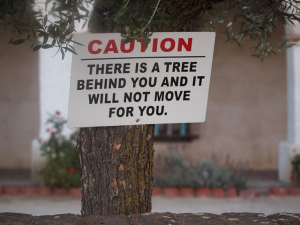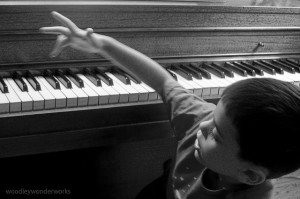This post continues Week 3 in a series of posts on topics that relate to writer’s residencies. Find other posts here and here. I am counting up towards the residency.

CC image “Mission San Miguel: Where the Trees are Obstinate” via J Maughn on Flickr. Some rights reserved.
I’ve been thinking about obstinacy. Obstinacy is a word with low approval ratings. Merriam-Webster defines it as the quality or state of being obstinate; stubbornness; the quality or state of being difficult to remedy, relieve, or subdue.
People in my family are obstinate. Sometimes they look like they are engaging in one-upmanship: I can be more obstinate than you! I know a lot about obstinacy on a personal level.
I’m working on acquiring obstinacy on an artistic level.
Obstinacy among artists isn’t always highly prized by their colleagues. Audiences are happy to consume the fruits of creative obstinacy, but that doesn’t make them want to hang out with obstinate artists.
What sets artists apart
According to a Norwegian study, the artistically inclined differentiate themselves from others by being less “sociable” and more emotionally “unstable,” among more virtuous descriptors, such as associative thinking, desiring originality, being inwardly motivated, and ambition (see a short article on this discussion here).
Emotionally unstable? I’d say this is where the legacy of famous “wild” or “tortured” artists has left its mark: Hemingway, Plath, Faulkner, Woolf, Van Gogh, and so on. Look up “tortured artist” and voila! — find lists and discussions of writers, poets, and painters who had known addictions and known or speculated mental illnesses.
Then we have the sociability issue (I’ll excuse you if you read this as anti-social). In fact, what the article defines as low sociability is a tendency to be “inconsiderate” and “obstinate.”
There’s that word again.
Why being obstinate is an advantage
Frankly, I think obstinacy is under-rated. When faced with a long and daunting task (like writing a book, or pursuing any kind of creative career, for example), it pays to be obstinate. When you need to finish a project, it pays to close the door behind you and keep other people out. The opposite of obstinate is “irresolute.” Yeah, that sounds like a bonus! Another word for irresolute is “indecisive.” Definitely my go-to person. Want to accomplish a goal? Talk to someone who’s obstinate.
Other antonyms for “obstinate,” according to thesaurus.com, include: obedient, pliant, soft, submissive, surrendering, and yielding.
Can you imagine a list of more passive adjectives? I have a hard time myself, and I’m an associative thinker (rimshot). None of these adjectives is an agent of their own destiny. They only want to sit around and be loved.
By contrast, synonyms for “obstinate” include: headstrong, steadfast, tenacious, dogged, indomitable, persistent, relentless, self-willed, strong-minded, and unflinching.
Yes, I am cherry-picking: if you look up “obstinate” you will find plenty of unsavory synonyms. My point is that we overlook the valuable aspects of obstinacy in favor of the more socially “acceptable” modes of being. Obstinate people aren’t perfect, but they DO stand a better chance of accomplishing their goals.
They are agents of their own narrative.
Obstinacy and getting past artistic adversity
Think of Stephen King and his spike. How many rejections did he accumulate before ever being published? Now he is a by-word for literary success. He didn’t get there by surrendering and being pliant.
I’ve wanted to do a writer’s residency for years, but I was always afraid to apply because I didn’t think I had the credentials. Here’s a secret, though (and I’m working on grasping its slippery tail every day): you get credentials by going out and getting credentials.
I’m going to finish this project by being obstinate. I might include some of those lovable adjectives in my book. When I’m done, they might even be me. For a while.
Join me — discover your own artistic obstinacy. Feel free to tell me about it. I’ll celebrate you.




